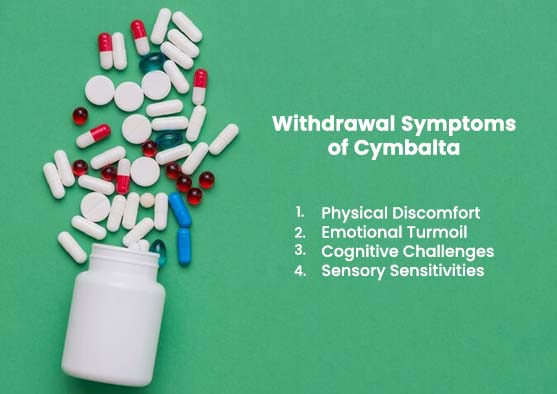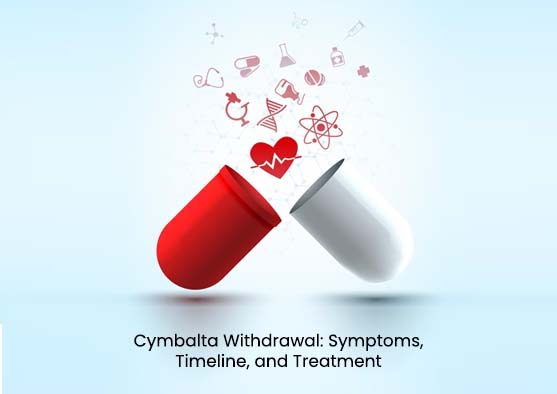Dealing with Cymbalta withdrawal can be challenging, but with the proper knowledge and strategies, you can navigate through it successfully. In this comprehensive guide, let’s go deep down into the symptoms, timeline, and effective treatments to help you cope with Cymbalta withdrawal.
What is Cymbalta?
Cymbalta (Duloxetine) is a prescription medication classified as a serotonin-norepinephrine reuptake inhibitor (SNRI). It is used to treat a variety of conditions, including major depressive disorder, generalized anxiety disorder, fibromyalgia, neuropathic pain associated with diabetic peripheral neuropathy, and chronic musculoskeletal pain.
By increasing the levels of serotonin and norepinephrine in the brain, Cymbalta can help improve mood, reduce anxiety, and relieve pain. Like all medications, Cymbalta can have side effects, and a healthcare provider should closely monitor its use.
Common Withdrawal Symptoms of Cymbalta

Physical Discomfort:
Physical symptoms are frequently reported during Cymbalta withdrawal. These may include headaches, dizziness, nausea, and fatigue. Such discomfort can significantly impact daily functioning and quality of life.
Emotional Turmoil:
Cymbalta withdrawal can also stir up emotional distress. Individuals may experience heightened anxiety, mood swings, irritability, and even depression. Coping with these emotional fluctuations can be challenging without proper support.
Cognitive Challenges:
Cognitive symptoms are another facet of Cymbalta withdrawal. Difficulty concentrating, memory problems, and brain fog are commonly reported. These challenges can impede productivity and overall cognitive function.
Sensory Sensitivities:
Some individuals undergoing Cymbalta withdrawal may encounter sensory disturbances. Heightened light, sound, or touch sensitivity can exacerbate discomfort and disrupt daily life.
Navigating the Cymbalta Withdrawal Timeline
Navigating the Cymbalta withdrawal timeline involves understanding the progression of symptoms and preparing accordingly:
-
First 24-48 hours after the last dose:
Some individuals may experience withdrawal symptoms within the first 24 to 48 hours after the previous dose. Early symptoms might include nausea, headache, and irritability.
-
First week:
Withdrawal symptoms can become more pronounced during the first week. Symptoms such as dizziness, brain zaps, anxiety, insomnia, and flu-like symptoms are common. The intensity of symptoms can vary from mild to severe.
-
Second week:
For many, symptoms may continue into the second week and can remain intense. However, some individuals may notice a gradual decrease in the severity of their symptoms during this period.
-
Beyond two weeks:
The duration of withdrawal symptoms can extend beyond two weeks for some individuals, especially those who have been on a high dose or have taken the medication for a long time. While the intensity of symptoms generally decreases over time, some individuals may experience prolonged withdrawal symptoms (lasting several weeks to months).
-
Long-term:
A small number of people may experience persistent post-withdrawal symptoms for months after stopping Cymbalta. These symptoms are generally less intense but can include mood swings, anxiety, and ongoing dizziness.
Effective Duloxetine Withdrawal Treatments at All American Detox Center
Discontinuing Duloxetine medication can lead to withdrawal symptoms, which can be uncomfortable and challenging to manage. At All American Detox Center, we recognize the importance of addressing these withdrawal symptoms with effective treatments tailored to each individual’s needs.
Comprehensive Assessment and Personalized Treatment Plans:
Upon admission to our center, individuals undergo a thorough assessment to evaluate their physical and mental health, as well as their history with Duloxetine usage. This allows our medical team to develop personalized treatment plans that address their specific withdrawal symptoms and overall well-being.
Medically Supervised Detoxification:
Detoxification from Duloxetine should be conducted under medical supervision to ensure safety and comfort. Our experienced healthcare professionals monitor patients closely throughout the detox process, providing necessary support and interventions to alleviate withdrawal symptoms.
Symptom Management Strategies
Withdrawal from Duloxetine can cause a range of symptoms, including nausea, dizziness, headaches, irritability, and mood swings. Our team employs various strategies to manage these symptoms effectively. This may include medications to alleviate discomfort and holistic approaches such as mindfulness techniques, acupuncture, and massage therapy.
Emotional Support and Counseling
Navigating Duloxetine withdrawal can be emotionally challenging, and individuals may experience heightened feelings of anxiety or depression. At All American Detox Center, we offer individual and group counseling sessions facilitated by licensed therapists. These sessions provide a safe and supportive environment for individuals to explore their emotions, learn coping strategies, and build resilience.
Education and Resources for Long-Term Recovery
Our commitment to our patients extends beyond the detox process. We provide education and resources to support long-term recovery from Duloxetine dependence. This includes information on healthy coping mechanisms, relapse prevention strategies, and connections to community support groups.
Transition to Aftercare Programs:
Upon detoxification completion, individuals can transition to our aftercare programs or receive referrals to appropriate resources in their community. These programs offer continued support and guidance as individuals navigate the challenges of maintaining sobriety and managing their mental health.
Check out our new blog on Understanding the Dangers of Withdrawal & Detox.
Conclusion
Coping with Cymbalta withdrawal requires patience, understanding, and effective management strategies. You can navigate this challenging period with resilience and determination by being informed about the symptoms, timeline, and treatment options.
At All American Detox addiction treatment in Los Angeles, we understand the complexities of Duloxetine withdrawal. We are dedicated to providing comprehensive treatment solutions that prioritize the well-being of our patients.
With our experienced medical team, personalized approach, and holistic therapies, we empower individuals to embark on recovery with confidence and support.
If you or a loved one is struggling with Duloxetine withdrawal, contact us today to learn more about our services and begin the journey toward healing.






No comment yet, add your voice below!